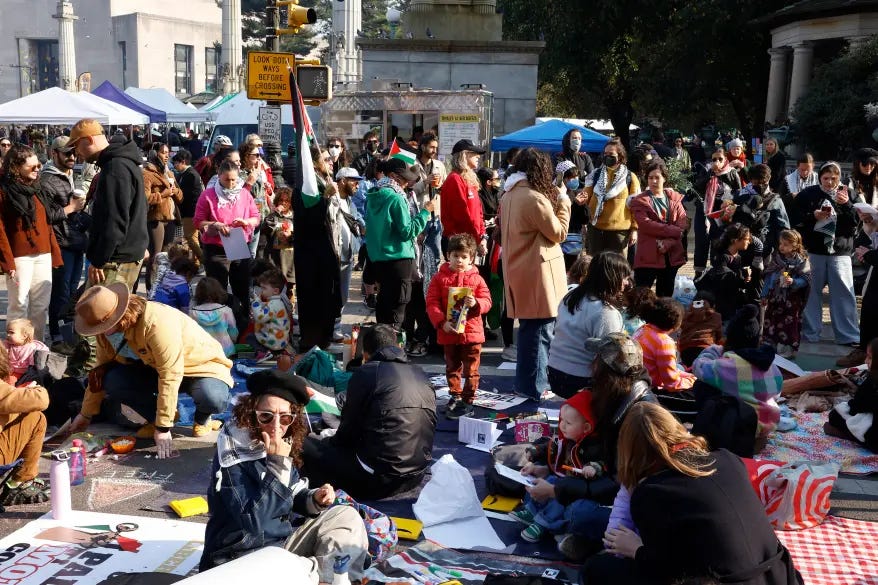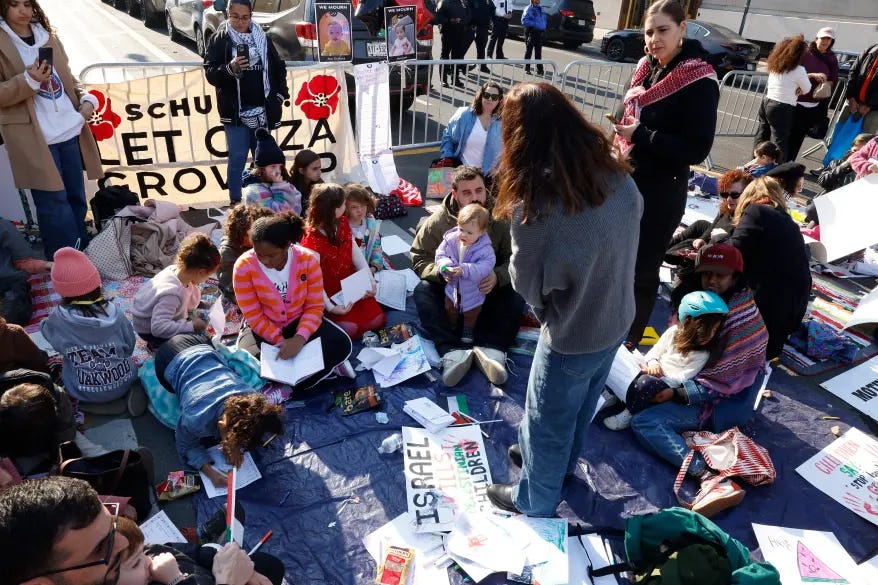The "Rage Playdate" Controversy: When Activism Meets Parenting
November 10, 2024
The intersection of parenting and political activism has always been a delicate balance. According to NY Post this weekend's "rage playdate" protest outside Senator Chuck Schumer's Brooklyn residence has ignited a fierce debate about the role of children in political demonstrations and the boundaries of protest activities near public officials' homes.

On a crisp November morning, approximately 60 protesters, including parents and their children, gathered outside Senator Schumer's Prospect Park West building. The event, dubbed a "rage playdate," featured children's coloring activities with political messaging and calls for policy changes regarding U.S. support for Israel.
Supporters of the demonstration argue several key points:
Early Civic Engagement: They believe exposing children to peaceful protest teaches valuable lessons about civic responsibility and standing up for one's beliefs.
Community Voice: The organizers aimed to demonstrate that their concerns span across generations and represent family-oriented constituents.
Creative Expression: The format attempted to make political expression accessible and age-appropriate through activities like coloring and letter-writing.
Protected Speech: Advocates maintain that peaceful assembly, even near officials' homes, is a constitutionally protected right.
“I will sue the s–t out of you,” one organizer told an officer.
Others chanted, “Schumer, Schumer you will see, Palestine will be free” and held signs that read, “Israel kills Palestinian children.”
“Chuck Schumer enables genocide,” one an organizer claimed.
Critics of the event raise several counterpoints:
Child Welfare Concerns: Questions arise about the appropriateness of involving young children in politically charged demonstrations and potential exposure to confrontational situations.
Safety and Security: The lack of proper permits raised legitimate public safety concerns, as acknowledged by NYPD's intervention.
Residential Targeting: The choice to demonstrate outside an official's private residence, rather than their office, raises questions about the line between protest and harassment.
Age-Appropriate Engagement: The mixture of children's activities with complex political messaging has sparked debate about whether such fusion trivializes serious issues.
The incident highlights several important legal considerations:
First Amendment protections for peaceful assembly
Local ordinances requiring permits for public gatherings
Restrictions on demonstrations near private residences
Child welfare and safety regulations
A children’s activity book featuring a character created by Palestinian cartoonist Naji al-Ali was distributed on Saturday. During the event, speakers from the organizing group, who chose to remain anonymous, delivered speeches. The workbook was created by the Palestinian Feminist Collective, one of the radical organizations highlighted in a recent report by the Network Contagion Research Institute and the advocacy group New York City Public School Alliance.
Looking Forward: A Path to Constructive Dialogue
As our society grapples with intensely felt political issues, we must consider:
Alternative Approaches: How can parents engage children in civic education while maintaining age-appropriate boundaries?
Protest Evolution: What does effective, responsible protest look like in an era where personal and political spaces increasingly overlap?
Community Standards: How do we balance the right to protest with residential privacy and public safety?
This incident reflects larger questions about modern activism:
The role of children in political movements
The boundaries between public and private spaces
The evolution of protest tactics in the digital age
The responsibility of parents as both citizens and guardians

The "rage playdate" controversy serves as a mirror reflecting our society's ongoing struggle to balance various rights and responsibilities: free speech versus public safety, political expression versus private space, parental authority versus child welfare. As we move forward, finding this balance becomes increasingly crucial for maintaining a vibrant democracy and a stable society.
Subscribe to Moms Justice for weekly analysis of crucial issues affecting families and communities.




